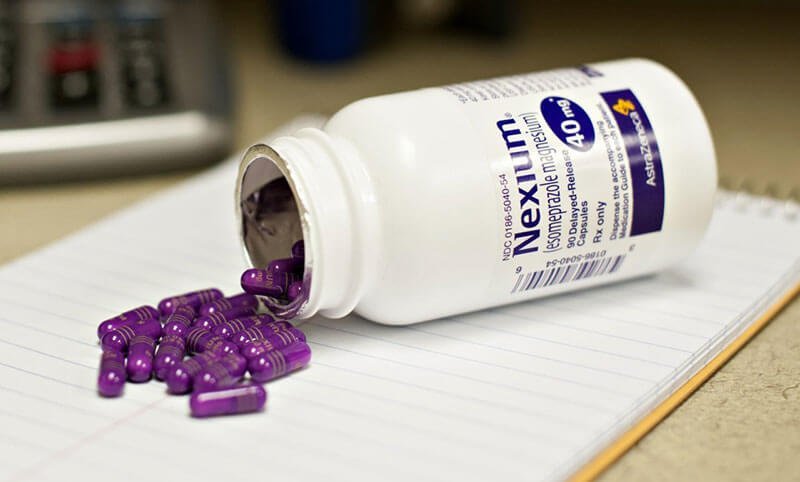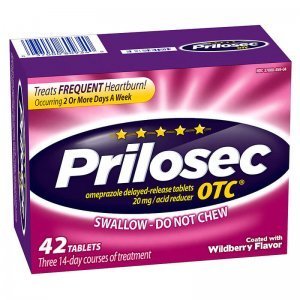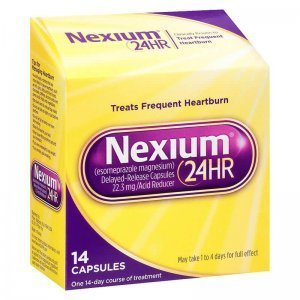Nexium, Prilosec & Prevacid: Quick Relief But Kidney Damage?

Most of us have suffered from heartburn at one time or another. It’s not too bad if it occurs infrequently, but for those who experience it several times a week or on a daily basis, it can be uncomfortable. For relief, many people choose to take medications such as Nexium, Prevacid, and Prilosec. These two drugs – both manufactured by AstraZeneca – are in a class of medications called proton pump inhibitors.
Over the years, numerous studies have linked the prolonged use of Nexium, Prevacid, and Prilosec to serious side effects. One, in particular, is acute interstitial nephritis, which is associated with kidney damage. This condition comes on suddenly and can lead to kidney damage, a transplant, or even death.
The dangerous drug attorneys of Nadrich Accident Injury Lawyers are investigating cases where a patient used one of the below drugs and was subsequently diagnosed with acute interstitial nephritis, kidney failure or any other type of kidney damage:
- Nexium
- Prilosec
- Prevacid
- Zegerid
- Dexilant
- Protonix
- Kapidex
- AcipHex
Nadrich Accident Injury Lawyers is representing those who have taken any of the above medications then been diagnosed with any of the following:
- Stomach cancer
- Gastric cancer
- Acute interstitial nephritis
- Acute kidney injury
- Renal or kidney failure
- Chronic kidney disease
- Kidney transplant surgery
- Dialysis treatment
If you have been diagnosed with any of the above after taking any of the above medications, immediately contact the attorneys of Nadrich Accident Injury Lawyers for a free consultation by calling 1-800-718-4658, using the live chat feature, or completing the contact form on this page.
The Food and Drug Administration (FDA) investigated and approved labeling changes to the product boxes in order to warn patients about the dangerous side effect. The Safety Information document updated by the FDA in December 2014 shows that a section was added to the drug label to include information about the risk of developing acute interstitial nephritis through Nexium use. The same was done for Prilosec, as seen in the FDA Safety information document. That update also occurred in December 2014.
What is Prilosec?

Prilosec was the first proton pump inhibitor to hit the market. In 1989, it was developed by AstraZeneca and approved by the FDA. It is the top drug for managing acid reflux disease. Its use has been associated with numerous side effects, including acute interstitial nephritis.
What is Nexium?
Nexium (esomeprazole) is known as “the purple pill.” This heartburn medication comes in 20 mg (over the counter) and 40 mg (prescription) doses. Nexium is used for heartburn occurring more than twice a week, as well as indigestion, peptic ulcers, and gastroesophageal reflux disease.
Nexium came to the market in 2001. It contains an ingredient –esomeprazole magnesium – that reduces stomach acid, making heartburn less likely to occur. It can also be used as a preventative medication to keep ulcers from occurring in people who are at risk. It differs from other antacids because it curbs acid production over a period of time rather than providing a quick fix.
What the Research Shows
In February 2016, the Journal of the American Medical Association (JAMA) Internal Medicine published a study about the increased risk of developing chronic kidney disease while using proton pump inhibitors. For nearly 14 years, 10,482 people were studied. Some used Nexium, others used a class of medications called H2-receptor antagonists. As a result, those who took two doses of Nexium daily were associated with a 20-50% higher risk of developing chronic kidney disease than the group who took one dose daily.
Another study focused on acute kidney injury, and the test group was comprised of 600,000 patients age 66 or older. Half of the test subjects took proton pump inhibitors, while the other half served as the control group. The rate of developing acute kidney injury among the proton pump inhibitor group was 13.49%, while the control group’s risk was less than half of that number, at 5.46%.
A study from Johns Hopkins Bloomberg School of Health used 250,000 participants. The 10-year risk of developing chronic kidney disease was 11.8% among those taking medications and 8.5% for non-users. In a second analysis, the numbers were 15.6% and 13.9%, respectively.
Kidney Damage Symptoms
Acute interstitial nephritis can lead to kidney damage. Sometimes it is reversible, but it many cases, it is not. It eventually leads to kidney failure, which requires a transplant. Without one, the patient can die.
Symptoms of kidney damage include:
- Changes in urination
- Swelling
- Nausea/vomiting
- Fatigue
- Skin rashes and itching
- Breath and a metallic taste in the mouth
- Shortness of breath
- Feeling cold
- Difficulty concentrating
- Pain in legs or upper back
- Recall Information
Despite the studies connecting the use of proton pump inhibitors with an increased risk of developing kidney damage, Nexium, Prevacid, and Prilosec have not yet been recalled. They are still available for purchase as over-the-counter medications and prescription drugs. The FDA continues to evaluate the recent studies in order to determine if additional action is needed to protect consumers.
Do I Have A Case?
If you or a loved one used one of the above medications and were subsequently diagnosed with acute interstitial nephritis, kidney failure or any other type of kidney damage, immediately contact the attorneys of Nadrich Accident Injury Lawyers for a free consultation by calling 1-800-718-4658, using the live chat feature, or completing the contact form on this page.
Call our legal team now for a 100% free, no-hassle case evaluation. Call now as there are strict deadlines for making a claim.


